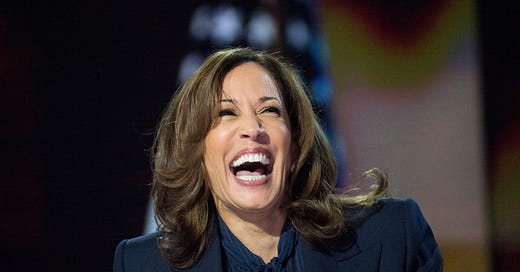
Trump Is Going to Lose. (Probably.)
The Democratic convention was a strategic masterstroke.
No Secret pod today. Sorry. People are in transit. Next week the world goes back to normal.
1. Strategery
This convention attempted to establish the following strategic positions:
The Democratic party as a broad and diverse, but wholly unified, front.
And also as the party of freedom and patriotism.
The election as a referendum on moving forward versus going back.
Kamala Harris as the change candidate.
On the first count, the convention was a total success. The Democratic party was a healthy and united institution.
Consider the following: Democrats featured Joe Biden, Hillary Clinton, Barack Obama, and Bill Clinton—that’s all but two of the living Democratic presidential nominees going back to 1992.
The Republican convention featured no former presidential nominees. The state of the Republican party is so toxic that previous nominees—even previous presidents—have been unpersoned and read out of the movement.
That’s a portrait of two institutions: One institution in harmony with its legacy and continuing to evolve in such a way as to hold its coalition together. The other institution in a state of convulsion.
On the subject of political diversity, the Democratic party had a wild advantage: Their convention featured every part of the ideological spectrum from Old Man Biden to AOC. It presented Democrats from the big cities and from the rural hinterlands. Culturally, this is a party that ranges from Tim Walz to Raphael Warnock, from Nancy Pelosi to Wes Moore.
Then the Democrats featured independents (Oprah) and Republicans (Adam Kinzinger, Olivia Troye, Stephanie Grisham).
Compare that with the Republican convention, which didn’t dare feature anyone outside the MAGA core.1
The conventions were indicative of the parties’ respective theories of the election. The Trump campaign is restricting the breadth of its appeal in the hopes that it can make up the numbers in depth: Target a smaller slice of the electorate, but try to turn them out at higher rates—and get just enough votes to win the Electoral College while losing the popular vote.
The Harris campaign is a broad-spectrum operation. They are trying to win as wide a swath of voters as possible through their ideological positioning while allowing their turnout to be driven by two other factors:
The cultural phenomenon of Kamala Harris.
Widespread loathing of Donald Trump.
As for positioning the Democrats as the party of freedom and patriotism, the convention was such a rah-rah, U-S-A! freedom fest that it felt like the 1984 RNC. If I had to sum up the DNC vibe in a gif it would be:
Which is a crazy accomplishment since it was the Republican convention that had the actual, flesh-and-blood, IRL Hogan.
Did the DNC succeed on the other two goals? Making Harris the change candidate and framing the election as future versus past?
We won’t know until we see the polling next week, but it’s hard to see how it could have failed. Trumpism is an explicitly backward-looking, revanchist project: Make America Great Again.2
Meanwhile the language at the Democratic convention was ceaselessly about “page turning” and “moving forward.” Harris’s catchphrase is “We’re not going back.”
All of which is to say that everything about the Democratic convention was both intentional and in furtherance of the campaign’s overall strategic vision.3
By next week we will get a sense of how it played with the electorate.
2. Trump’s Three-peat
Donald Trump is on track to lose the popular vote for a third consecutive election; a mark of futility and failure unlikely to be duplicated.4
He should lose the Electoral College, too.
I don’t mean “should” as a moral judgment. I’m talking about odds and strategies—the array of pieces on the board.
Trump is an old man. He’s a failed president who lost re-election by a wide margin and has been persistently unpopular for the entirety of his political career. He left office with the economy in shambles and unemployment raging. He is running a backward-looking campaign based on personal grievance and a factually incorrect view of America as a hellscape.5
He is running against a young, dynamic Kamala Harris who, as the sitting vice president, is both a change-agent and the heir to a strong economy. Unemployment remains historically low. Wage growth is strong. Voters persistently say that their financial situations are good. People are still buying lots of boats.
And this young, dynamic candidate is positioning her coalition to expand on the 51.3 percent of the vote that her ticket won four years ago.
That’s the topographic map of the campaign and in such territory, Harris is going to win most of the time.
The only thing keeping the outcome in doubt is the Electoral College.
We’ve gotten so used to the Electoral College effect over the last seven years that we’ve lost sight of how bizarre and ahistorical it is.
There has never been a period in American history in which one political party gave up on the popular vote and sought to win power purely as a minority party. On the exceedingly rare occasions when minority rule happened, it was an accident that was quickly remedied.6
During the Trump years, the Republican party has fully accepted its status as the minority party and focused on maneuvering within the Electoral College, rather than trying to build a national majority.
Again: This is ahistorical.
But the thing about the Electoral College is that while it offers a rural minority party the chance to win executive power, that move is never going to be a high-percentage play. Depending on the year and the circumstances, it’s like drawing to either an inside- or an outside-straight.7
So Trump is going to lose. Probably.
I understand that “probably” does a lot of work here.
Imagine that you’re going in for surgery and you say to the doc, “Is this procedure going to kill me?” And she replies, “Probably not.” Would you feel good about that?
When the stakes are high, even good odds are scary.
But this is where we are as a country, as a people. Something like 40 percent of the population is no longer interested in democracy. That’s because these people have become a minority party and—this is the crucial part—they have seen that there are pathways to power as the minority party.
One of those pathways is the Electoral College. Another is January 6th. Having embraced the former, Republicans are now—at best—ambivalent about the latter. And both of those pathways are more attractive to this 40 percent than the kind of compromise and evolution which might lead them to win a majority.
In order to get out of this space, America needs one of two things:
Republicans cease to embrace their minority status and begin competing again to create a national majority; or,
The Republican party shrinks a bit further—another 5 points should do—so that its chances to win an Electoral College victory drop to a less dangerous level.8
Only Republican voters can choose #1. The rest of us have some agency on #2.
Kamala Harris is doing her part. We need to do ours.
That’s what we’re doing here. I hope you’ll join us. Last night Kamala used a phrase that I’ve been saying since this crisis began: We’re all in this together.
3. About Kamala
I feel the need to keep saying this about Harris: We have no idea what sort of president she will be. Maybe she’ll be a great president. Maybe mediocre. Maybe bad. There are some encouraging signals.9
But her speech last night was very good. Her entire campaign has been very good. We are watching a politician execute, at the highest level, with an enormous degree of difficulty. Harris is doing something extraordinary and I don’t think we should take that for granted.
One person not taking Harris’s performance for granted? Donald Trump.
He has seen the same things we’ve seen and they have made an impression on him, too. Trump understands that he’s facing a cultural freight-train.
Big crowds. Big guest stars. Big TV ratings. A candidate who wears the historical nature of her job lightly. A candidate who is strong.
Trump looks at Harris and sees how tough and hard-headed she’s been.
Harris comes across as kind, but she is wholly unsentimental. Trump noticed how smoothly she flipped on single-payer healthcare and fracking. He saw how deftly President Biden was ushered offstage after the first night. He understands that he is facing a formidable woman who is clear-eyed about what it takes to win.
I suspect that over the last four weeks Trump has been comforted by the Supreme Court’s get-out-of-jail-free card. Because he understands that he is likely to lose this election and will need it.
One last thing: Bulwark contributor
was fantastic last night. And he had maybe the most important line of the convention:“Democracy knows no party.”
I want to put that on a pillow.
Three cheers for that guy. He’s great. He’s everything that we’re trying to do here, together.
Adam, thank you for your courage and your good-cheer. For your honesty and your heart. You sir, are a great American.
Correction August 23, 2024, 12:01 pm: The piece originally stated that the DNC featured all but one of the living Democratic nominees since 1992. That is incorrect. It featured all but two of them: John Kerry and Al Gore.
Obviously I’m talking about political diversity. If we talked about racial or cultural diversity, the comparisons get kind of embarrassing. The Democrats ranged from Mindy Kaling to Steph Curry. The Republicans ranged from Dana White to Kid Rock.
I still can’t believe that JD Vance said the blood-and-soil part out loud at the RNC:
America is not just an idea. It is a group of people with a shared history and a common future. It is, in short, a nation.
Now, it is part of that tradition, of course, that we welcome newcomers. But when we allow newcomers into our American family, we allow them on our terms. That’s the way we preserve the continuity of this project from 250 years past to hopefully 250 years in the future.
Enormous credit should go to Harris and her campaign team. They built this plane while they were flying it. The biggest knock on Harris during the 2020 primary was her skill as the executive of a campaign organization.
In this race she’s been exceptionally competent at that part of the job.
Can you imagine standing before the entire country three times, asking them to pick you, and having your fellow citizens say “no thanks” every time?
Is it even worth saying that since his last defeat, Trump was convicted of 34 felonies?
For instance: The 2000 election was such an accident that the Bush administration immediately set to fixing the problem and winning plurality support in 2004.
Depending on what kind of poker you play, hitting an “open” or outside straight is roughly twice as likely as drawing to an inside straight.
We could probably live with a MAGA party that had a 10 percent chance of victory every four years. We can’t function long-term when MAGA has >30 percent chance of victory.
For instance: Her selection of Walz and her decision to position herself in the broad middle of her party.


















I am not a Republican. I have never been a Republican. But without this never-Trump space I am not sure how I would have navigated my way through these last few weeks/years. Thank you Bulwark for all that you do.
.
America is not a rich kids toy to be played with.
Now, let’s go win this thing.
I had the opportunity to be there last night and was deeply proud of both Democrats in the room and Kinzinger on the stage for the respect they paid one another.